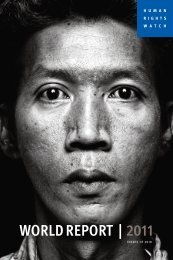SUPREME COURT OF CANADA CITATION: Alberta v. Hutterian ...
SUPREME COURT OF CANADA CITATION: Alberta v. Hutterian ...
SUPREME COURT OF CANADA CITATION: Alberta v. Hutterian ...
You also want an ePaper? Increase the reach of your titles
YUMPU automatically turns print PDFs into web optimized ePapers that Google loves.
[1] The Province of <strong>Alberta</strong> requires all persons who drive motor vehicles on highways tohold a driver’s licence. Since 1974 each licence has borne a photograph of the licence holder,subject to exemptions for people who objected to having their photos taken on religious grounds.In 2003 the Province made the photo requirement universal in order to reduce the risk of driver’slicences being used for identity theft, a growing problem in <strong>Alberta</strong> and the country. All licenceholders are now required to have their photos taken for purposes of placement in the Province’sfacial recognition data bank.[2] The Wilson Colony of <strong>Hutterian</strong> Brethren maintains a rural, communal lifestyle,carrying on a variety of commercial activities. They object on religious grounds to having theirphotographs taken. After the religious exemption to the photo requirement was revoked in 2003,Colony members began these proceedings against the <strong>Alberta</strong> government, alleging a breach of theirreligious freedom. The Province has offered to lessen the impact of the universal photo requirementby issuing special licences without photos, relieving Colony members of the need to carry theirphotos. However, it insists that their photos be taken for purposes of placement in the central databank. The members of the Wilson Colony have rejected this proposal.[3] The case has proceeded on the basis that the universal photo requirement constitutes alimit on the freedom of religion of Colony members who wish to obtain a driver’s licence and thusinfringes s. 2(a) of the Canadian Charter of Rights and Freedoms. The issue on this appeal iswhether this limit is a reasonable limit demonstrably justified in a free and democratic society unders. 1 of the Charter. If not, the regulation is inconsistent with the Charter and is null and voidpursuant to s. 52 of the Constitution Act, 1982.
















